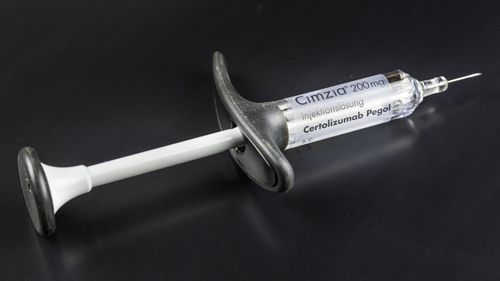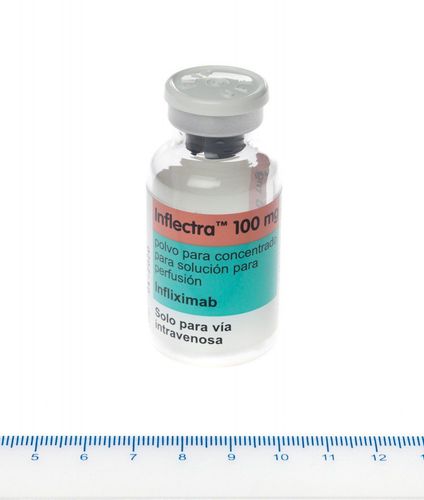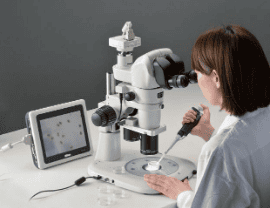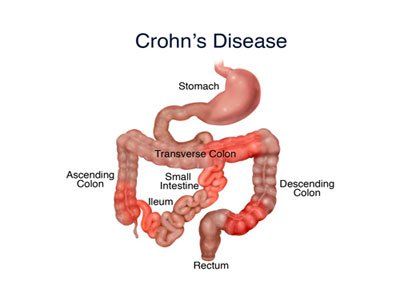This is an automatically translated article.
Posted by Master, Doctor Mai Vien Phuong - Department of Examination & Internal Medicine - Vinmec Central Park International General Hospital
There is currently no cure for Crohn's disease, but it can be well managed with the right treatment. Using drugs that regulate the way your immune system can reduce inflammation and symptoms of the disease. TNF-alpha inhibitors are known as biologic therapies. TNF stands for "tumor necrosis factor".
1. Treatment of Crohn's disease
There is currently no cure for Crohn's disease, but the disease can be well managed. There are many treatment options that can reduce the severity and frequency of your symptoms.
1.1. Medicine
Several medications are available that can treat Crohn's disease such as anti-diarrheal and anti-inflammatory drugs. More advanced options include biologics, which use the body's immune system to treat disease.
Which medication or combination of drugs should be used depends on the symptoms, medical history, and severity of the disease.
1.1.1. Anti-inflammatory drugs
The two main anti-inflammatory drugs that doctors use to treat Crohn's are oral 5-aminosalicylate and corticosteroids. Anti-inflammatory drugs are often the first medicine you take to treat Crohn's disease.
You usually take these medicines when you have mild symptoms accompanied by occasional flare-ups. Corticosteroids are used for more severe symptoms but should only be used for short periods of time.
1.1.2. Immune conditioning
The overactive immune system causes inflammation that leads to the symptoms of Crohn's disease. Medicines that affect the immune system, called immunomodulatory drugs, can reduce the inflammatory response and limit your immune system's response.
1.1.3. Antibiotics
Some doctors believe that antibiotics can help relieve some of the symptoms of Crohn's and some of its possible triggers.
For example, antibiotics can reduce drainage and heal fistulas. Antibiotics can also kill any foreign or "bad" bacteria present in your gut that may be contributing to inflammation and infection.
1.1.4. Biological therapy
If you have severe Crohn's, your doctor may try one of several biological therapies to treat the inflammation and possible complications from the disease. Biologic drugs can block specific proteins that can cause inflammation.
1.2. Change your diet
Food does not cause Crohn's disease, but it can cause flare-ups.
After diagnosing Crohn's, your doctor will likely recommend making an appointment with a dietitian. Your dietitian will help you understand how foods can affect your symptoms and what dietary changes might help.
They may ask you to keep a food diary at first. This food diary will detail what you ate and how it felt.
Using this information, your dietitian will help you create eating guidelines. These dietary changes will help you absorb more nutrients while limiting any negative side effects the food may cause.
2. What are bioinhibitors?
Biologics are powerful therapy in the treatment of Crohn's disease. They can also cause very serious side effects. It is usually prescribed for people with moderate to severe Crohn's symptoms or if other treatments have not worked.
Biologics are drugs made from living cells that block the immune system's natural response to an antigen or something your body considers harmful.
In people with Crohn's disease, the body's immune system cannot tell the difference between foreign substances and the body's own tissues. This causes inflammation that produces so many symptoms.
Biologic therapies, unlike other Crohn's disease treatments, strongly target specific proteins that cause gastrointestinal inflammation.
However, this active therapy can affect your health in other ways.
There are three types of biologic inhibitors:
TNF-alpha inhibitors Integral blockers Interleukin blockers
2.1. TNF-alpha . inhibitor
TNF-alpha inhibitors are commonly sold under the brand names Remicade, Humira, and Cimzia.
Some people with Crohn's disease can take TNF-alpha inhibitors at home. These people are provided with a pen or syringe with just the right amount of medication. Your doctor will give you a dosage schedule and then you will self-medicate.
TNF-alpha inhibitors suppress the immune response that causes Crohn's disease symptoms. However, suppressing this immune response can create new problems.
These drugs cannot just stop the immune system from attacking your own tissue while keeping your natural immune responses intact. This makes you more susceptible to other diseases and infections and can sometimes increase your risk of developing certain cancers.
You may have an increased risk of tuberculosis while taking this medicine. In addition to injections or intravenous treatments, you also need to check your skin regularly to make sure you don't have an infection.

2.2. Integrin blockers
Natalizumab (Tysabri) and vedolizumab (Entyvio) are integral blockers. These drugs work by interfering with the way white blood cells attach to the lining of the intestines. This reduces inflammation and relieves other symptoms.
However, Integrarin blockers also cause some serious side effects, even leading to death. Their benefit in the treatment of Crohn's disease should be weighed against the side effects and benefits of TNF-alpha inhibitors when making treatment decisions.
Before you can use natalizumab, you must sign up for a program called TOUCH. The TOUCH Prescription Program is the only way you can get Tysabri.
2.3. Interleukin inhibitors
The third class of biologics used to treat Crohn's are interleukin inhibitors. Ustekinumab (Stelara) is the only drug in this class that has been approved by the FDA.
Ustekinumab targets two specific proteins thought to cause inflammation: interleukin-12 (IL-12) and interleukin-23 (IL-23). People with Crohn's disease have higher levels of IL-12 and IL-23 in their bodies.
By targeting these proteins, ustekinumab suppresses inflammation in the digestive tract and reduces symptoms of Crohn's disease.
Ustekinumab is used to treat adults with moderate to severe Crohn's disease who have not responded sufficiently to conventional therapy. It is initially given intravenously under the supervision of a healthcare professional.
Subsequent doses of ustekinumab may be given subcutaneously every eight weeks, by the healthcare provider or the patient himself after he or she has been trained. Like other biologics, ustekinumab may increase the risk of infection.
Conclusion
Your doctor may prescribe biologic therapies if you have moderate to severe Crohn's disease or if other treatments have not worked for you. Be sure to ask and fully understand the possible side effects of all medications your doctor prescribes for you.
Vinmec International General Hospital is one of the hospitals that not only ensures professional quality with a team of doctors, modern equipment and technology, but also stands out for its examination, consulting and service services. comprehensive and professional medical treatment; civilized, polite, safe and sterile medical examination and treatment space.
Please dial HOTLINE for more information or register for an appointment HERE. Download MyVinmec app to make appointments faster and to manage your bookings easily.
References source: Crohn's & Colitis Foundation and the Challenges in IBD Working Group. (2019). Challenges in IBD 2019, Di Domenicantonio R, et al. (2018). Population-based cohort study on comparative effectiveness and safety of biologics in inflammatory bowel disease.














